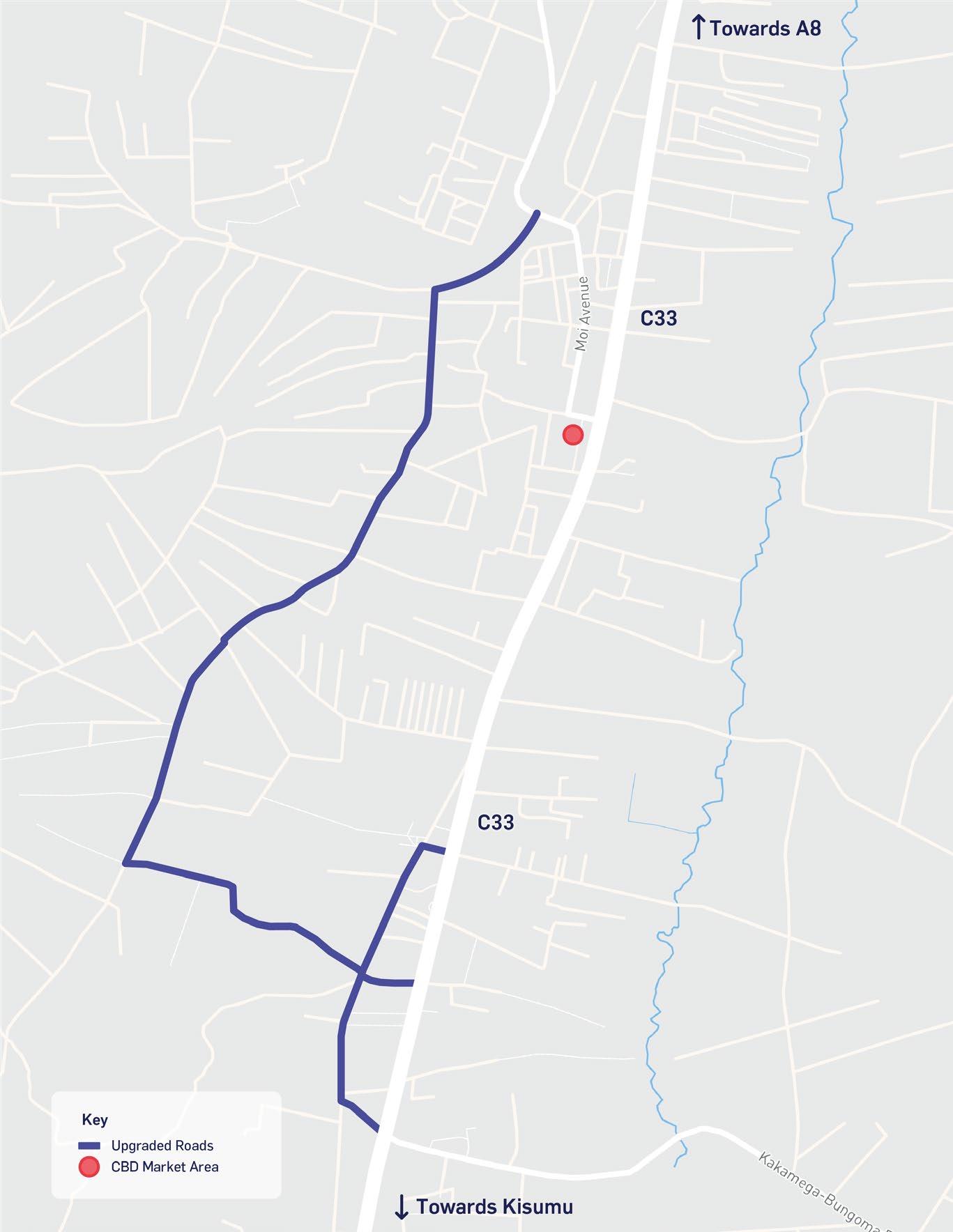
4 minute read
Figure 1-2 – UEP process
1.3 Approach
The approach and methodology have been developed in response to the FCDO terms of reference and in consultation with the SUED team and FCDO and have been tailored to consider local conditions in Bungoma Municipality. The aim was to enable a collaborative approach between different local stakeholders and the consultant team to assess Bungoma Municipality’s economy in a systematic way, develop an agreed economic vision and prioritise actions that will have maximum impact and that are ready to attract donor co-financing. The preparation of the UEP comprised four main phases:
> Phase 1 – Inception phase: which focused on the Kick-off
Meeting. The aim was to present the approach of the UEP and capture key opportunities and challenges affecting economic growth in Bungoma Municipality as defined by local stakeholders; > Phase 2 – Diagnostics phase: this was undertaken to provide a comprehensive and wide-ranging assessment of Bungoma Municipality’s economy, demographics, infrastructure, environment and climate change risk profile against national and international context; > Phase 3 –Technical briefing paper: this set out a development framework for Bungoma Municipality and identified, assessed and prioritised urban and economic growth opportunities and their requirements; and > Phase 4 – Development of the final UEP which sets out in detail economic opportunities and actions and prioritises inclusive climate-resilient infrastructure projects for implementation.
The Bungoma Municipality UEP has been developed utilising primary and secondary research and analysis, ranging from the review of local and national strategies, and international studies to statistical analyses, to focus group discussions with a wide range of local stakeholders, business surveys and site assessments.
Figure 1-2 – UEP process
Source: Atkins, 2022
Stakeholder Engagement
The purpose of stakeholder engagement has always been to ensure that stakeholders’ interests and views are taken into consideration throughout the development and reflected in the Bungoma Municipality Urban Economic Plan. More specifically, the aims were:
> To ensure that the development of the UEP is inclusive and is undertaken in a manner that fits with Bungoma
Municipality’s business and community culture. > To ensure that all stakeholders are clear on the purpose, scope, recommendations and outcomes of the Urban
Economic Plan as well as meeting key stakeholders’ aspirations and gain buy-in from them. > To understand better the interests of specific groups, especially the vulnerable ones and how the Urban Economic
Plan can benefit them; and > To provide a regular flow of information to and from key stakeholders.
The stakeholders that have been continuously consulted and participated in the UEP process included:
> County Government including HE the Governor, HE the
Deputy Governor, County Secretary, CECM Lands and
Physical Planning, CECM Agriculture, Livestock, Irrigation,
Fisheries & Co-operative Development, CECM Roads,
Transport & Public Works, Chief Officers, Directors > County Assembly including the Speaker of County
Assembly, Clerk of County Assembly, Committee Members in charge of Physical Planning > Municipal Board including Chairperson, Vice-Chair,
Municipal Manager and Board Members > Business Representatives including Chamber of
Commerce (KNCCI), organised business groups, traders and Jua Kali, SACCOs, banks and finance organisations, transport owners & operators, Maendeleo Ya Wanawake,
Chebukobe/Municipal Market representatives,
Women enterprise > Utilities and Service Providers including the Nzoia Water
Company, Boda Boda Associations; KURA, KENHA, KPLC and solar providers > Special Interest Groups (SIGs) including representatives for women, local community youths, people living with disability (PWD) and National Youth Council representatives > NGOs and CBOs including Civil Society, self-help groups
The Urban Economic Plan (UEP) has been a stakeholder driven process. The process of receiving and disseminating information to the wider stakeholders have been primarily done through the following platforms.
> Project Steering Group meetings. > Stakeholder workshops. > Formal social consultations; and > Business consultations
At the outset of the project, a Project Steering Group (PSG) with representatives from various key groups was constituted with the help of the Municipality to enable the exchange of ideas and information between the Municipal Board, SUED technical team and wider stakeholders. The following representatives were nominated for PSG membership. > County Economic Advisor > Director of Physical Panning > Municipal Economist > Chairman of Chamber of Commerce > Municipal Finance officer > Chairman of People Living with Disability > Representative of Civil Society > 3 Representatives of the Municipal Board > Public Health Officer > Chairman of the markets > Youth Leader > Women Leader > Municipal Works officer
The aim is to ensure the PSG is representative of the needs and challenges associated with the Municipality whilst being aligned and familiar with existing County and Municipal policies and regulations.
The PSG, under an elected representative, also facilitated the dissemination of information on the various components and progress of the UEP and the broader SUED programme, including liaison with the County Government, the Municipality and the Municipal Board. It includes champions on SUED’s key themes of climate change and social inclusion.
The PSG was also tasked with arranging meetings and workshops as and when required by the SUED team, as part of the overall programme roll out. The PSG was updated on a bi-weekly basis on progress in the UEP process and the following meetings between the PSG and the SUED team took place.










